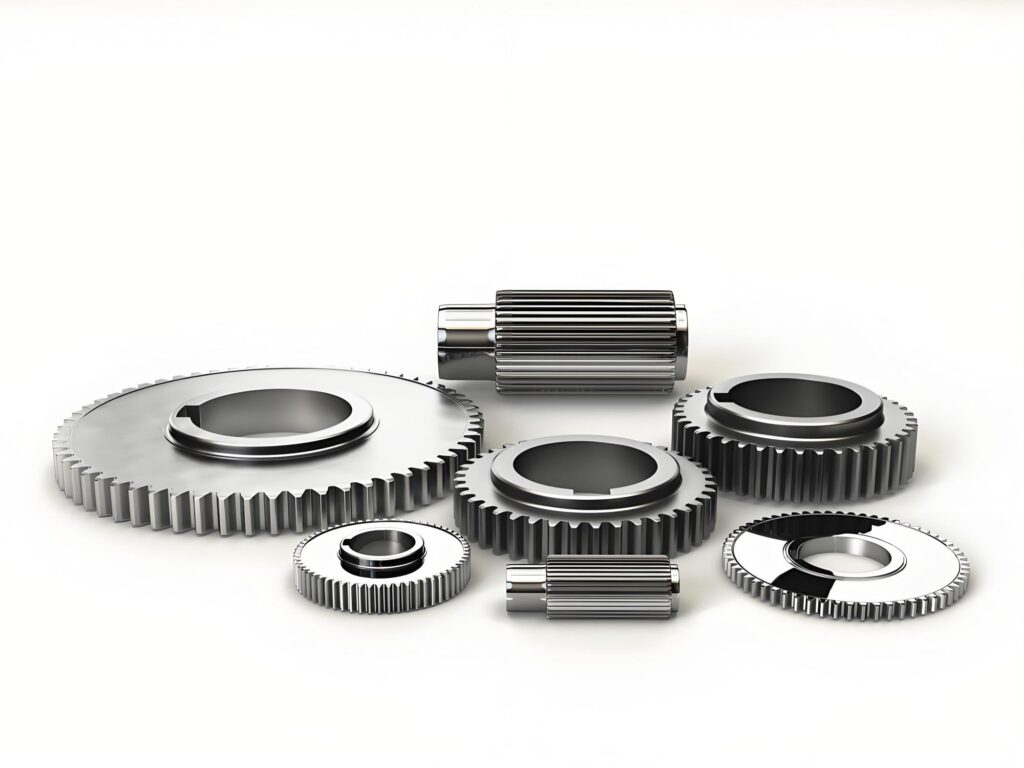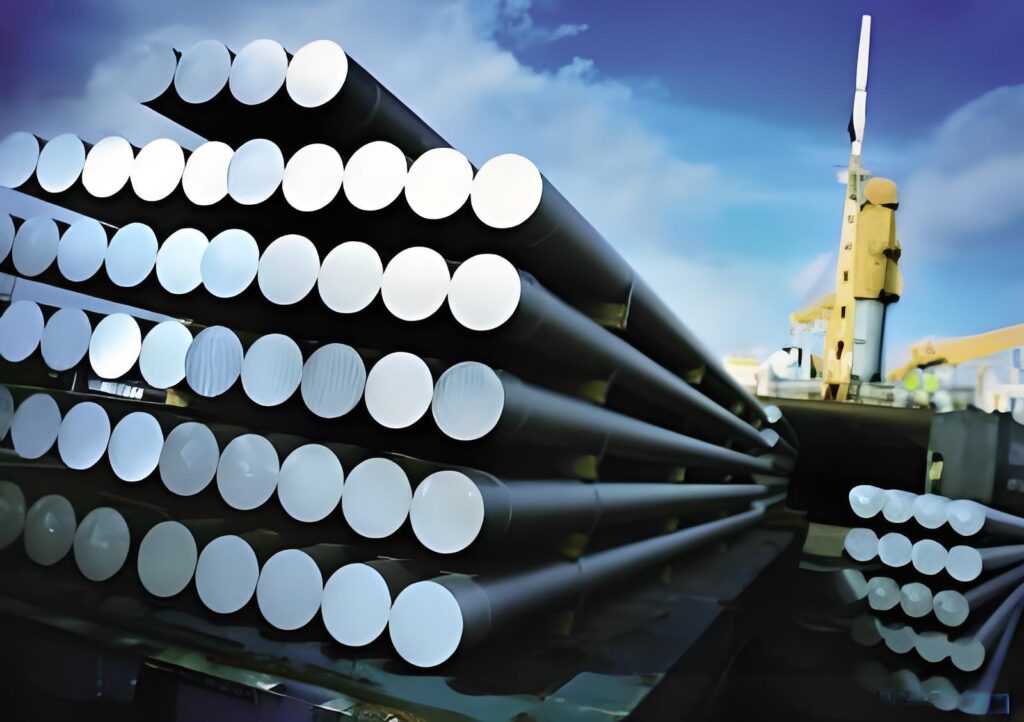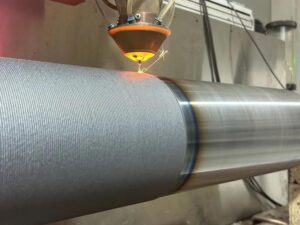Steel, a cornerstone of modern manufacturing, is celebrated for its strength, versatility, and durability. At Precionn, we harness the power of steel to craft precision parts that meet the exacting demands of our clients. This blog dives deep into the world of steel, exploring its composition, production, properties, types, applications, advantages, and weaknesses, offering insights for enthusiasts and professionals alike.
What is Steel?
Steel is an alloy primarily composed of iron and carbon, renowned for its strength and adaptability. It’s a material that has shaped civilizations, from ancient swords to modern skyscrapers. Unlike pure iron, steel’s carbon content—typically between 0.02% and 2.1%—enhances its hardness and tensile strength, making it indispensable in construction, automotive, aerospace, and countless other sectors. At its core, steel represents a balance of resilience and workability, which is why it’s a preferred material in precision machining processes.
Steel’s versatility stems from its ability to be tailored through alloying and heat treatment. By adding elements like chromium, nickel, or molybdenum, manufacturers can create specialized steel grades suited for specific applications. This adaptability makes steel a favorite in industries requiring precision, durability, and performance.
What is Steel Made Of?
Steel’s primary ingredients are iron and carbon, but its properties can be fine-tuned by adding various alloying elements. Iron, derived from iron ore, forms the base of steel. Carbon, though present in small amounts, significantly impacts the material’s strength and hardness. Too much carbon can make steel brittle, while too little results in a softer material.
Common alloying elements include:
- Chromium: Enhances corrosion resistance, as seen in stainless steel.
- Nickel: Improves toughness and resistance to extreme temperatures.
- Manganese: Increases strength and wear resistance.
- Molybdenum: Boosts corrosion resistance and strength at high temperatures.
- Vanadium: Enhances strength and toughness.
Trace elements like silicon, sulfur, and phosphorus may also be present, influencing machinability and other properties. At Precionn, we work with a variety of steel grades, ensuring each component meets precise specifications through careful material selection and machining expertise.
How is Steel Produced?

The Steel-Making Process
Steel production is a complex process that transforms raw materials into a versatile alloy. The two primary methods are the Basic Oxygen Steelmaking (BOS) and Electric Arc Furnace (EAF) processes.
Basic Oxygen Steelmaking (BOS)
In BOS, molten iron from a blast furnace is combined with scrap steel and oxygen. High-purity oxygen is blown into the furnace, reducing carbon content and impurities. This method is efficient for producing large quantities of steel, often used for construction-grade materials.
Electric Arc Furnace (EAF)
The EAF process uses electricity to melt scrap steel, offering greater flexibility for recycling and producing high-quality steel. It’s particularly suited for creating specialized alloys used in precision machining. Precionn often works with EAF-produced steel for its consistency and quality.
Key Stages of Steel Production
- Ironmaking: Iron ore is smelted in a blast furnace with coke and limestone to produce molten iron.
- Steelmaking: Molten iron is refined in a BOS or EAF furnace, adjusting carbon and alloy content.
- Casting: Molten steel is cast into slabs, billets, or blooms.
- Rolling and Shaping: Steel is rolled into sheets, bars, or other forms.
- Heat Treatment: Processes like quenching or tempering enhance steel’s properties.
These steps ensure steel meets the exacting standards required for applications like automotive parts, aerospace components, and industrial machinery.
Properties of Steel
Steel’s unique properties make it a go-to material for countless applications. Its key characteristics include:
- Strength: Steel’s high tensile strength allows it to withstand heavy loads and stresses.
- Ductility: Steel can be shaped without breaking, ideal for machining and forming.
- Durability: Steel resists wear and tear, ensuring long-lasting performance.
- Corrosion Resistance: Certain alloys, like stainless steel, resist rust and chemical degradation.
- Thermal Conductivity: Steel conducts heat effectively, useful in specific industrial applications.
These properties vary depending on the steel’s composition and treatment. For example, high-carbon steel is harder but less ductile, while low-carbon steel is more malleable. Precionn leverages these properties to deliver precision-machined components tailored to client needs.
Steel series Types
Steel comes in various types, each designed for specific purposes. The main categories include:
Carbon Steel
Carbon steel, containing primarily iron and carbon, is the most common type. It’s divided into:
- Low-Carbon Steel: Highly ductile, used for structural beams and automotive panels.
- Medium-Carbon Steel: Balances strength and ductility, ideal for gears and shafts.
- High-Carbon Steel: Extremely strong but brittle, used for tools and blades.
Stainless Steel
Stainless steel, alloyed with chromium (at least 10.5%), resists corrosion and is widely used in medical devices, kitchenware, and marine applications. Common grades include 304 (general-purpose) and 316 (marine-grade).
Alloy Steel
Alloy steel includes elements like nickel, molybdenum, or vanadium to enhance specific properties. It’s used in high-stress applications like aerospace components and heavy machinery.
Tool Steel
Tool steel is designed for cutting and shaping, offering high hardness and wear resistance. It’s commonly used for drills, dies, and molds.
Specialty Steels
These include weathering steel (resists atmospheric corrosion) and high-speed steel (used for cutting tools). Precionn’s expertise allows us to machine a wide range of steel types, ensuring precision and quality.
Applications of Steel

Steel’s exceptional strength, versatility, and corrosion resistance make it a cornerstone material across industries. Below are its key applications, including specific components:
Construction
Steel’s high strength-to-weight ratio enables the creation of robust, lightweight structures like skyscrapers, bridges, and infrastructure. Its durability ensures long-lasting performance in harsh conditions.
- Components: Structural beams (I-beams, H-beams), reinforcing bars (rebar), steel columns, roofing panels, and bridge cables.
Automotive
Steel’s durability, formability, and cost-effectiveness are critical for manufacturing reliable vehicle parts. Companies like Precionn supply precision-machined steel components for enhanced performance.
- Components: Chassis frames, engine crankshafts, transmission gears, body panels, suspension springs, and exhaust systems.
Aerospace
High-strength, lightweight steel alloys withstand extreme temperatures and stresses, making them essential for aircraft and spacecraft components where safety and precision are paramount.
- Components: Landing gear, turbine blades, engine mounts, fasteners (bolts, screws), and structural frames.
Energy
Steel’s resilience and corrosion resistance make it ideal for energy infrastructure, enduring harsh environments in renewable and traditional energy systems.
- Components: Pipelines, wind turbine towers, rotor shafts, oil rig platforms, pressure vessels, and solar panel frames.
Medical
Stainless steel’s biocompatibility, corrosion resistance, and ease of sterilization make it ideal for medical applications, ensuring safety and reliability in critical healthcare settings.
- Components: Surgical instruments (scalpels, forceps), orthopedic implants (plates, screws), dental tools, and medical equipment casings.
Consumer Goods
From kitchen appliances to cutlery, steel’s aesthetic appeal and durability enhance everyday products.
These applications highlight steel’s role in shaping the modern world, and Precionn is proud to contribute through precision machining.
What Are the Advantages of Steel?
Steel offers numerous advantages that make it a preferred material:
- Strength and Durability: Steel’s ability to withstand heavy loads and harsh conditions ensures long-term performance.
- Versatility: With countless grades and forms, steel suits diverse applications.
- Recyclability: Steel is 100% recyclable, supporting sustainable manufacturing.
- Cost-Effectiveness: Steel provides excellent value due to its durability and availability.
- Customizability: Alloying and heat treatment allow steel to meet specific requirements.
These advantages make steel a cornerstone of industries like construction, automotive, and aerospace, where Precionn’s machining expertise shines.
What is steel type weakness?
Despite its strengths, steel has vulnerabilities:
Corrosion
While stainless steel resists rust, other types are prone to corrosion in moist or chemical environments. Protective coatings or alloying can mitigate this.
High Temperatures
Steel loses strength at extreme temperatures, limiting its use in certain applications. Specialized alloys like nickel-based steel address this issue.
Brittleness
High-carbon steel can be brittle, making it unsuitable for applications requiring flexibility.
Weight
Compared to materials like aluminum, steel is heavier, which can be a drawback in weight-sensitive applications like aerospace.
Precionn addresses these weaknesses by selecting appropriate steel grades and applying precision machining techniques to ensure optimal performance.
Steel in Precision Machining
In precision machining, steel’s workability and strength are critical. Processes like CNC milling, turning, and grinding transform steel into complex components with tight tolerances. At Precionn, we specialize in machining steel to meet the exacting standards of industries like aerospace, automotive, and medical. Our advanced equipment and skilled team ensure every part meets client specifications, leveraging steel’s properties to deliver exceptional results.
The Future of Steel
The steel industry continues to evolve, driven by innovations in production and sustainability. Advances like green steel (produced with minimal carbon emissions) and smart alloys (with enhanced properties) promise to expand steel’s applications. As industries demand higher performance and eco-friendly solutions, steel remains at the forefront of material science.
Precionn stays ahead of these trends, integrating cutting-edge machining techniques to work with the latest steel grades. Our commitment to quality and innovation ensures we deliver components that meet the evolving needs of our clients.
Why Choose Precionn for Steel Machining?
Precionn stands out as a trusted partner in precision machining, offering unparalleled expertise in working with steel. From carbon steel to specialty alloys, we deliver components that meet the highest standards of quality and precision. Our state-of-the-art facilities and skilled team ensure every project, from automotive parts to aerospace components, is executed flawlessly. Visit our website to learn how Precionn can bring your steel-based projects to life with unmatched precision and reliability.




